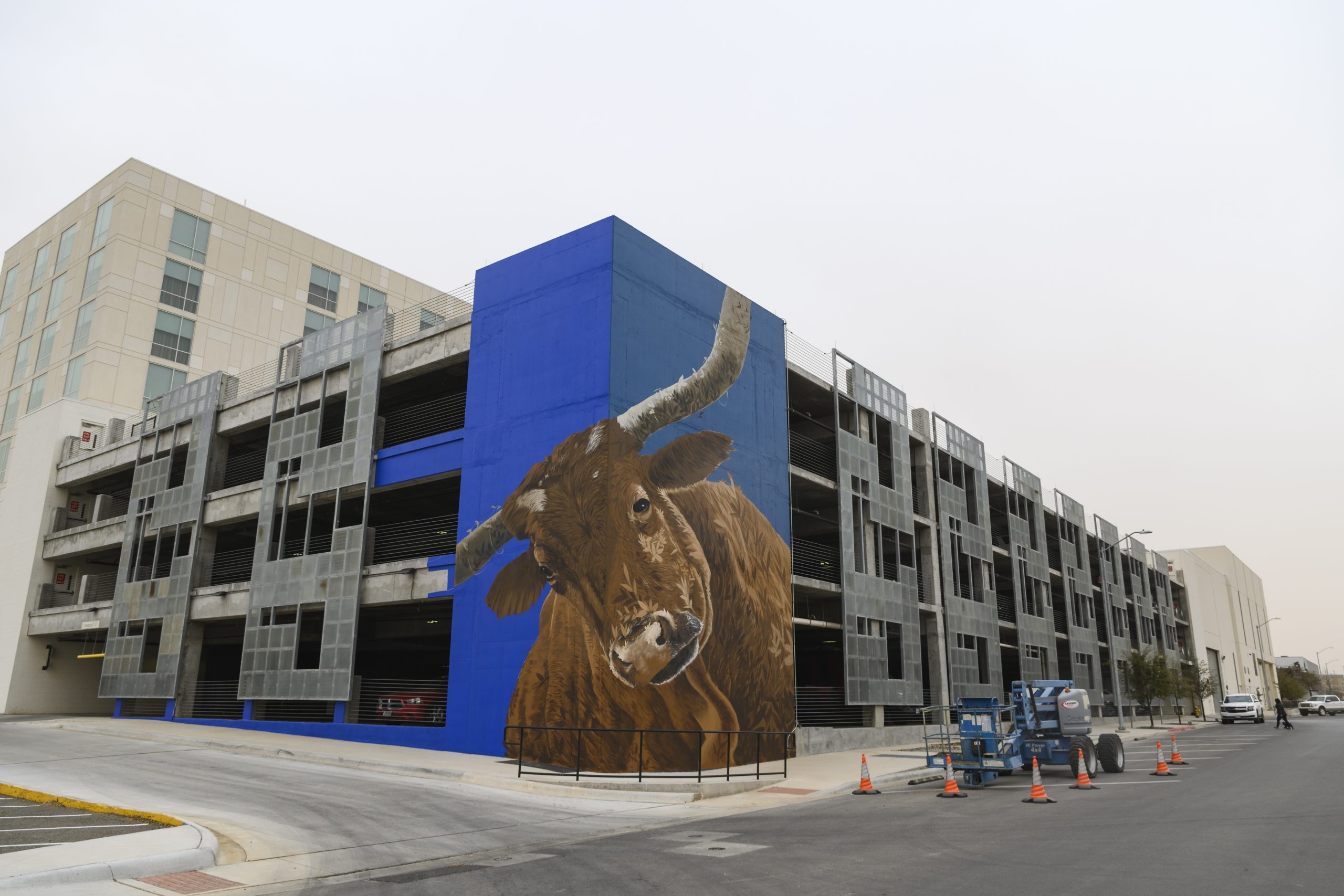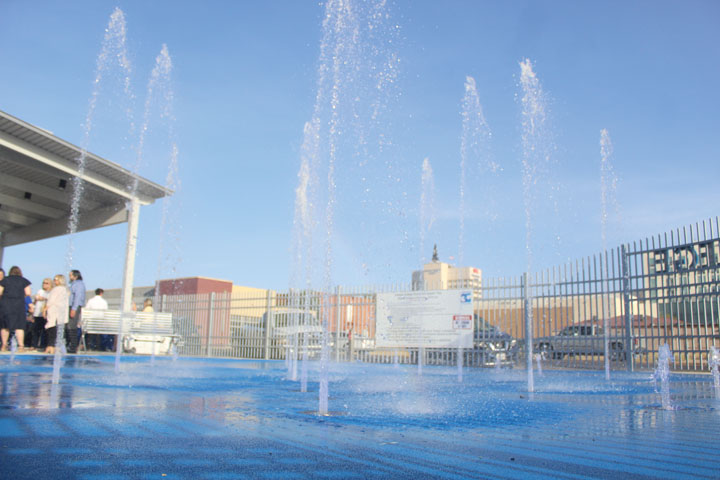
The fate of Downtown Odessa will be discussed by the Odessa City Council Tuesday night.
Because he wants to discuss the issue with the council first, City Manager John Beckmeyer declined to go into specifics Friday. However, he confirmed he no longer wants the city to fund the organization that is dedicated to preserving and promoting the downtown area.
The non-profit organization, which is also partially funded by hotel occupancy taxes and individual, civic and business contributions, recruits new businesses to the area using Odessa Development Corporation facade and infrastructure grants.
However, it is best known for putting on such events as Tacos and Tequila, Hot Summer Nights, Firecracker Fandango and the Parade of Lights.
Downtown Odessa receives roughly $60,000 from the city and $450,000 from hotel occupancy taxes, which pays for salaries, benefits, security at events and electric boxes.
Beckmeyer said if the council adopts his recommendation, events will fall under the auspices of the Parks and Recreation Department, which already helps with some aspects of them.
Downtown Odessa’s executive director, Elizabeth Prieto, and her sole employee will be offered employment in another city department, Beckmeyer said.
Beckmeyer said his recommendation is based on the findings of a task force formed to study each of the city’s departments. In the case of Downtown Odessa, the task force was asked to assess its “operating effectiveness, efficiency and ascertain gaps that may impede achievement of business objectives.”
According to materials provided to the city, the task force determined there are several weaknesses with Downtown Odessa. For example, it said the existing programs don’t have much of an impact when it comes to tourism and hotel taxes, it relies too much on hotel occupancy taxes and fundraising to operate, training efforts haven’t focused on economic development initiatives and some of the services/activities are duplicative.
In addition, the task force determined there are threats to Downtown Odessa, including the fact that downtown is struggling due to changes in retail, public transportation isn’t accessible, employers are moving in and out and housing costs are high.
The city manager said if the council accepts his recommendation, they’ll have until the end of the month to “unwind things” and make sure they’ve developed a solid plan for future events and the development of downtown. At that point, the city will be doing a mid-year budget review and be in the midst of planning next year’s budget.

Ulterior motives?
Craig Stoker, a Downtown Odessa board member, said he believes there are forces in Odessa who have long hated the public-private Marriot Hotel and Conference Center venture that was approved by a past city council and de-funding Downtown Odessa is just the latest act that proves it.
“I don’t know why (they hate the Marriott), but the powers that be have systematically taken apart every piece that has been put into place to help downtown Odessa and shore up the hotel and conference center,” Stoker said.
In August 2023, the city council disbanded the Tax Increment Reinvestment Zone, which was created by the city council in 2019 to attract new investment in the downtown area. Taxes were paid into the zone by Medical Center Hospital, Odessa College and the City of Odessa.
Mayor Javier Joven justified the dissolution at the time saying Odessa College didn’t want to participate anymore and Ector County wasn’t interested in joining. According to Odessa College Board of Trustee Chairman Gary Johnson and Ector County Judge Dustin Fawcett he was wrong.
Joven said he believed downtown could be revitalized or developed without the TIRZ because the right council and the right commissioners and hospital board are now in place.
“I keep hearing this council say ‘We are for downtown. We want to see downtown succeed. Big things are coming. Just wait. Big things are coming,’ but their actions aren’t matching those words,” Stoker said.
Stoker said any deal with the hotel would’ve been made 10 years ago, three city managers ago, four councils ago, “and the only deal I’m aware of between the hotel and the city involved a rebate on hotel occupancy tax for three years, which my understanding is the hotel never took, and one year donated $1 million to the Odessa College project. Unlike council, their actions match their words.”
The only two public entities that have proven their dedication to downtown are Odessa College and Ector County, Stoker said.

Odessa College has built a large green space, a covered stage, two performance canopies, an entryway, a splash pad, restrooms and parking for food vendors at 4th Street and Jackson Avenue. In addition, they are building a 24,000-square-foot academic building with classrooms and conference rooms for students and entrepreneurs nearby.
Ector County is dedicated to building a brand new 54,000 square foot, $58 million library at Third Street and Texas Avenue.
“Other than those, the city projects have been cancelled, contractors have been fired, boards had been disbanded so if they’ve got something up their sleeve, they’re running out of time,” Stoker said, referring to the November election.
As for the fired contractors, Stoker was referring to KDC Associates, a landscape architect that was given a $650,000 contract to design and oversee a downtown entertainment district.
The council passed a $93 million certificate of obligation in August 2019 to pay for new fire stations, a police multipurpose building, an animal shelter, park improvements and the widening of Faudree Road.
Festival street
There exists a long-standing disagreement as to whether $7 million of the funds were put aside for the downtown entertainment district, too.
Joven and council members Denise Swanner and Mark Matta had voted against the KDC contract to begin with because of the amount and the details of the plan. KDC wanted to spend $7 million focusing on a two-block section of Jackson Avenue.
KDC chose Jackson Avenue over Texas Avenue, at least in part, because it’s closer to the Marriott and Odessa College’s new plaza.
Joven has regularly expressed his disgust money was spent updating the 2016 downtown master plan in 2022, saying the updated plan merely “regurgitated” the old one.
Although Joven has said he doesn’t think COB money is supposed to be spent on the entertainment district, he has also complained about the fact construction has not yet begun.
KDC Associates partner Kelly Cook and former Downtown Odessa Executive Director Casey Hallmark argued the Jackson Avenue plan was the next step toward implementing the master plan.
The latest downtown master plan includes improving downtown’s “walk-ability” with helpful signs and beautifying the area with public art and landscaping. It also spoke about increasing housing and working with Odessa College on its projects.
However, last November the city council voted to repeal a February 2020 ordinance that set aside 1% of certain capital improvement projects to pay for public art. Examples of such artwork are located at the OPD training facility, Odessa Fire Rescue stations No. 9 and No. 6, the animal control facility on 42nd Street and at the Family Wellness Clinic on Lee Street.
Beckmeyer, who joined the city in August, said he doesn’t know much about any festival streets.
Stoker is convinced the ODC grants for infrastructure and facades were successful in attracting new businesses downtown. He also said that if officials truly believe Downtown Odessa didn’t focus on economic development enough, then they should have paid its executive director more.
“I think that’s unfair because a true economic development professional has a salary in the range of $150,000 and I know when Casey Hallmark took the position they were paying $63,000,” Stoker said. “You were never going to recruit somebody who had a background in economic development with that kind of a salary.”
He conceded it’s difficult to discern how many “heads in beds” Downtown Odessa can take credit for, or in other words, how much they can claim in hotel occupancy rates. He alleged certain city officials have been “after” those taxes for awhile so they can put them toward their favored projects.

Stoker said he hopes Parks and Recreation has the “bandwidth” to take on all of the events Downtown Odessa put on, Stoker said.
“Hopefully they’ll see the benefit of creating a position to coordinate all these things because this stuff doesn’t just happen,” Stoker said. “There’s a lot of committee work. There’s a lot of board work and there’s a lot of volunteer work that goes into these things. I would just hate for that to go away…it would just seem like a very big shame if they dropped some balls and got egg on their face.”
Stoker, who was the president of the TIRZ board, also pointed out it’s the second time he’s been on a board about to be disbanded without being given advance notice.
“This isn’t in the work session. They don’t do these things in the work session where you have the opportunity to have discussions,” Stoker said.
Other matters
During the council’s work session, Utilities Director Kevin Niles will ask council members to consider using $2 million in contingency funds for the water treatment plant rehabilitation and miscellaneous upgrades project. There’s just shy of $13 million in contingency funds.
According to materials provided to council members by Niles, the city council appropriated $95 million in certificates of obligation in November 2021 and the water treatment plant rehab began in January 2022.
Niles said the project is expected to be finished in March 2025, but 25 change orders have been approved and the funds set aside for owner concessions have been depleted.
Also on the work session agenda is a possible revision to an ordinance that would allow the city to charge an $8 monthly fee to residents for additional solid waste roll out carts. Residents would be allowed to have a maximum of two per household.
In addition, the council will be asked to consider awarding a bid for recycling to Diamondback Recycling. Diamondback Recycling would accept all recyclables at the Time Machine for $60,000 a year, but the city would haul the recyclables to the company’s facility.
During the work session, the council will also be asked to revert back to having a city marshal for Odessa Municipal Court. The court changed from having a city marshal to having a warrant officer in 1983. If approved, the city marshal would appoint one or more deputies to provide safety for staff and members of the public.
In addition, the council will also consider donating the Dixie Boulevard building the Girl Scouts of the Desert Southwest are currently renting to the Girl Scouts or giving them a 99-year lease.
Lastly, Town and Country Drug, which plans to purchase the former Fire Station No. 6 from the city for $350,000 has discovered issues with the building and they’ll be discussed Tuesday as well.



